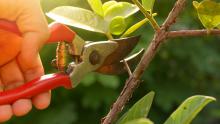Turning rubbish into added-value resources

The NEW-MINE project will identify and develop enhanced landfill-mining technology to transform landfill waste into high-added-value products, such as fuel and building materials.

The NEW-MINE project will identify and develop enhanced landfill-mining technology to transform landfill waste into high-added-value products, such as fuel and building materials.

The water-energy-food nexus presents a unique opportunity for the agriculture industry. An EU-funded consortium of research teams saw this opportunity and introduced a new approach to matching water demand with available energy offer to save water without affecting crop production so that the competitiveness of irrigated agriculture is improved.

It's a hub. It's a community. It's marketplace. Oppla, an online platform dedicated to natural capital, ecosystem services and nature-based solutions, was launched in September 2016 by two EU-funded research projects. It has been growing rapidly, and if everything goes to plan, it may soon be going global.

As temperatures rise, water scarcity and quality in the Mediterranean basin are growing concerns. An EU-funded team has developed clever, safe aquifer management solutions for a market that is set to expand as rainfall becomes less predictable.

EU-funded researchers have been recognised for their ground-breaking work on recovering and reusing waste material in nuclear fusion reactors. They developed and demonstrated new membrane technologies capable of decontaminating waste and extracting valuable tritium for re-use.

If the arrival of spring is not enough to get you out walking and cycling, an EU-funded initiative is launching a number of mobile applications offering incentives to lead a more active lifestyle, reduce urban congestion and fight pollution.

The more planners know about how people move around a city, the easier it is for them to develop sustainable transport policies. EU-funded researchers have used data from personal smart devices to shed light on urban mobility and improve transport planning tools and models.

Waste prunings from orchards, vineyards and olive groves could be a valuable source of biomass energy and help boost rural economies, say EU-funded researchers. The key ingredient is a sustainable supply chain.

The production of cement and lime involves fossil fuels and produces harmful greenhouse gases. Industry could change this, if scientists can develop a technology that can use solar power for high temperature industrial processes. The EU-funded SOLPART project has built lab-scale reactors that use a solar powered process to meet this need.

High-performance biocomposites derived from wheat straw and recycled paper? EU-funded researchers have developed new materials and components based on substances isolated from these renewable residues. They have also found a way to extract silica from the straw, offering a greener alternative to current production methods for this compound.